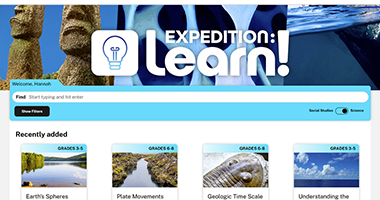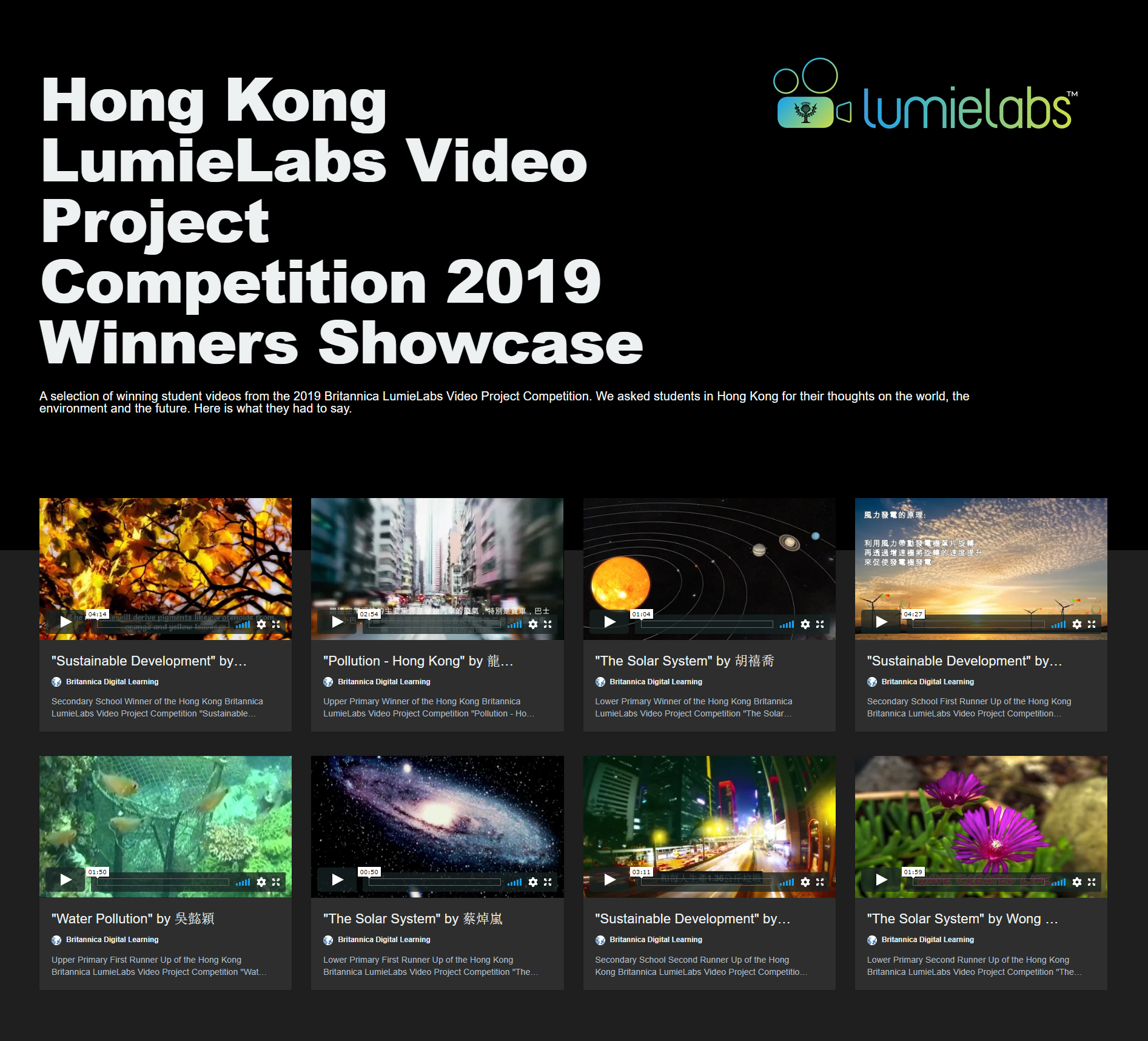The award presentation ceremony for the 2019 Britannica LumieLabs Video Project Competition, hosted by HK STEM Education Association and sponsored by Britannica Digital Learning, concluded on 14th December 2019, in Hong Kong.
Despite being in its inaugural year, close to 100 teams registered to participate. Each team began their research and preparations in October, before commencing production on their videos in November. All submissions were of extraordinary quality, and our judges had difficulty picking the winners. After careful consideration, the judging panel finally selected the following winning teams from each category. Their videos were screened during the award ceremony.
Congratulations to our winners!
We invited one of the participating teachers – Miss Li Kam Ping from QualiEd College, to share her experience with using video-creation platforms like LumieLabs, as well as her insights on STEM education today.
In recent years, Hong Kong has been heavily promoting interactive, cross-curriculum and inter-disciplinary learning to enhance the learning capacity of students. The act of learning has always been an interconnected process; as students acquire knowledge and solve problems, they are also gaining skills not found inside textbooks, such as independent thinking skills, analytical skills, interpersonal skills, creativity and public speaking skills. Schools need to take this into consideration when organising events and competitions, in order to encourage creativity in students and inspire their ongoing interest in the changing world around them.
For the 2019 Britannica LumieLabs Video Project Competition, QualiEd College nominated 7 teams, consisting of students ranging from Form 1 to Form 6. It was a profound learning experience, and one that I wish to share with friends and colleagues who are interested in creative learning:
Using creative platforms to engage student learning
We all know that knowledge is abundant in the online world. However, the challenge for teachers is being able to engage students to proactively seek out this knowledge. For this competition, the use of Lumielabs allowed students to unleash their creativity and consolidate their research in brand new ways, using LumieLabs’ video and sound editing capabilities, as well as the tens of thousands of existing media clips from its database. The competition allowed students to have fun while applying their learning. Students were engrossed in the learning process, which in turn enhanced their learning outcome.
Cross-curriculum project based learning
As mentioned before, learning is holistic; there are no distinct boundaries in knowledge. Throughout the competition, students were exposed to various aspects of knowledge, including science, engineering, geography, product design and presentations. The completed video might seem short and therefore simple, when in reality it required teams to complete their own research, plan their own story and design their own end product. It was in fact, a complete project-based learning experience. This type of project-based learning requires more class time to complete, but nurtures students’ persistence as well as their willingness to experiment and challenge themselves.
Fostering Teamwork and collaboration
Similar to other STEM competitions, the LumieLabs competition required teamwork in order for each individual team member to play to their own strengths. During the learning process, each student gradually began to demonstrate development in either programming, script-writing, recording or editing. This is the same in the workplace, where businesses are made up of collaborative departments performing different functions. For a team to function smoothly, we must learn to work together, accept each other’s differences while developing self-awareness for our own strengths and weaknesses.
Two of our competition participants had no previous experience in video creation. While these students were learning to use LumieLabs, they worked with each other and discovered some tips and shortcuts to the platform’s functionality. These senior form students were then invited to share their learning with our Form 1 students. The senior students needed to reshape their knowledge into a format that could be passed onto and understood by their junior counterparts. At the same time, the junior students helped the seniors discover a better way of using questioning techniques to ensure their juniors could understand and retain what they were taught. This interaction between the two student groups not only consolidated learning, it was also effective in advancing students’ patience and communication skills.
In today’s schools, interactive learning between peers is far more effective than direct instruction from teachers. This is because much of non-textbook based knowledge comes from the accumulation of life experiences.
The completed video might seem short and therefore simple, when in reality it required teams to complete their own research, plan their own story and design their own end product. It was in fact, a complete project-based learning experience.
Creative Thinking and Expression
In this age of innovation, asking students to only excel academically in the arts or sciences is an outdated mindset. Jack Ma, the founder of Alibaba Group, stated that: ‘The future will be an age where we pursue innovation, we need to educate our students in sports, music and art…” These are soft skills. In a time where knowledge is so readily accessible online, what students still lack are interpersonal and communication skills, as well as the creative thinking skills that will empower them to build upon existing ideas or turn their own ideas into real solutions for the betterment of society.
These soft skills cannot be obtained from textbooks or online. They need to be acquired through interactive learning via projects or competitions, where each student is given the opportunity to develop their own ways of thinking and working with others. Perhaps we can be frank when we say that today’s young people indulge in the online world and often lack social skills. By guiding their participation in creativity-driven competitions like this one, where teams work together to turn learned knowledge into new ideas, we can help to foster our students’ creative thinking. The ability to transform hard knowledge into soft skills is an important foundation for students’ future success in the workplace.
In conclusion, participating in a few innovative, cross-curriculum competitions is beneficial for student learning. In the age of innovation, subject-area knowledge must be paired with soft skills. This is why schools around the world have invested so heavily in technological innovation. Yet education in Hong Kong tends to lack this kind of forward-thinking, instead focusing excessively on teaching academic knowledge. Teachers can consider providing students with more opportunities to take part in innovative projects or competitions that will allow the future thinkers, builders and leaders of our society to apply their knowledge and skills in a fun and engaging context.
Written by Mr Cheung Ka Chun (HK STEM Education Association) and Miss Li Kam Ping (QualiEd College). 作者:香港科創教育協會 張嘉進先生, 匯知中學 李錦坪老師
Translated into English by Britannica.
This article was first published in “Ecampus Today” issue 253.


